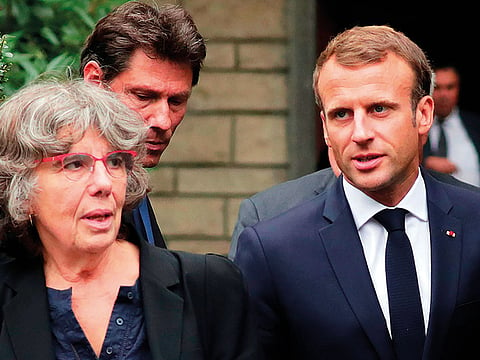France admits to systemic Algeria war torture
Macron calls for opening of archives concerning those who disappeared

Paris - France formally recognised Thursday the French military’s systemic use of torture in the Algerian War in the 1950s and 1960s, an unprecedented step forward in grappling with its long-suppressed legacy of colonial crimes.
President Emmanuel Macron announced his watershed decision in the context of a call for clarity on the fate of Maurice Audin, a Communist mathematician and anti-colonial militant who was tortured by the French army and forcibly disappeared in 1957, in the midst of Algeria’s bloody struggle for independence from France.
Audin’s death is a specific case, but it represents a cruel system put in place at the state-level, the Elysee Palace said. “It was nonetheless made possibly by a legally instituted system: the ‘arrest-detention’ system, set up under the special powers that been entrusted by law to the armed forces at that time,” a statement by Macron’s office said.
Benjamin Stora, a leading French historian of Algeria who has authored more than 20 books on the subject, said that Macron’s decision represented a step away from “the silence of the father” that has characterised France’s relationship to its colonial past for decades.
“It permits us to advance,” he told The Washington Post. “To exit from denial and to advance in the service of truth.” Stora was due to accompany Macron on Thursday afternoon on an official visit to Audin’s widow, Josette Audin, now 87.
Macron, 40, has shown a rare willingness to wade into the memory of Algeria, arguably the most sensitive chapter in the French experience of the 20th century and one that has had a profound influence on the country’s current political institutions.
Conquered by France in 1837, Algeria was a colony but also cast as an integral part of the country. By the 1950s, it was home to millions of French settlers, and when France was forced to give up overseas possessions in West Africa and Southeast Asia, it always held on tightly to Algeria.
When the country revolted in 1954, the suppression was savage.
The shadow of the Algerian war on French society has often been compared to that of Vietnam in the US, but even more divisive.
On a visit to Algeria in February 2017, Macron, then a presidential candidate, went so far as to call French colonialism “a crime against humanity,” a remark that reignited a bitter national debate.
In addition to recognising state-authorised torture, Macron also called for the opening of archives concerning those who disappeared, such as Audin.
“A general dispensation, by ministerial decree, will be granted so that everyone - historians, families, associations - can consult the archives for all those who disappeared in Algeria,” the statement read. “We’re putting the issue of the missing in the centre.”
Macron’s decision drew immediate hopeful comparisons to the last time a French president publicly atoned for the sins of the past - Jacques Chirac’s 1995 apology for France’s collaboration in the Holocaust, specifically in facilitating roundups of its own citizens who were then handed over to the Nazis.
Chirac’s speech represented a major shift in the way the French public and political establishment understood its past. In the years that followed, a more nuanced picture of France’s role in the Holocaust was taught in national schools, and memorials were erected around the country, including a prominent Holocaust memorial museum in central Paris.
Some wonder if similar action on Algeria, once unthinkable, could now be in the cards.
The two events are vastly different, said Stora, who was born in Algeria in 1950 to a Jewish family that then left for France in 1962, in the midst of the upheaval. But Macron’s decision nevertheless presented many former colonial subjects, he noted, including French Muslims of Algerian origin, “the sentiment of being respected in their history.”
“It will be very difficult for political successors to walk this back,” Stora said.
For Yasser Louati, a Muslim community organiser and prominent activist against Islamophobia in France, Macron’s decision is a “historic moment” but one that does not go far enough.
If the French president has now drawn attention to colonial crimes that occurred in Algeria, there is still a reluctance to confront the legacy of colonial violence that occurred in France itself, such as the brutal October 1961 massacre by French police of pro-independence Algerian protesters in Paris.
Historians estimate that as many as 200 were killed in that event, but the exact figure remains unclear.
“We also have to deal with the legacy of the colonial era,” Louati said, referring to how the war shaped repressive aspects of country’s institutions.
France’s current system of government came into being in 1958, in the middle of the Algerian War, and entirely in response to an attempted coup by a group of French generals in Algiers.
The whole political system in fact has grown out of the trauma of that time.
Despite his rhetoric, Macron has hardly shied away from using these colonial-era executive powers as his president, and at other points in his presidency has relied on security provisions that stem from Algeria, notably the “state of emergency” put in place after recent terrorist attacks.
Among other things, the provision, which dates from 1955, gives French authorities the power to place terrorism suspects under house arrest without warrants, which critics and activists said led to French police detaining French Muslims with impunity.
Macron’s administration successfully enshrined portions of these colonial-era emergency provisions into everyday French law. The original emergency provisions were initially intended to be only temporary.



